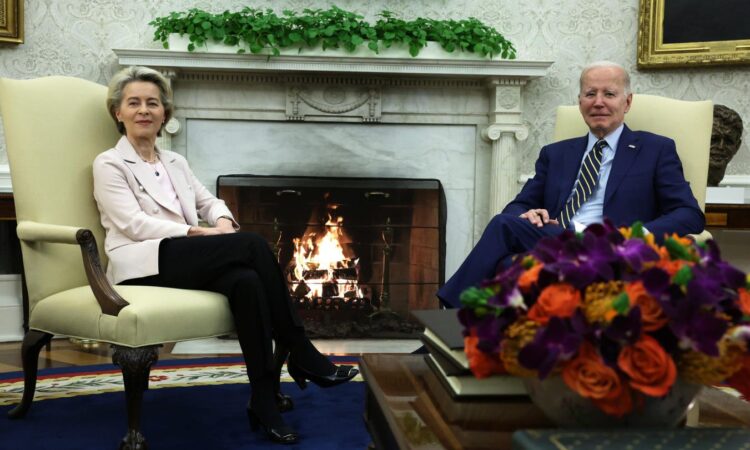
WASHINGTON, DC – MARCH 10: U.S. President Joe Biden (R) meets with President of European Commission … [+]
Getty Images
2024 is the most election-heavy year the world has seen on record. Over 2 billion people across 50 countries are expected to go the polls this year, with many elections having already taken place in countries like Pakistan and Bangladesh. South Africa and India are both in the midst of the voting cycle as we speak – and next up is Europe.
The European Parliament elections are coming up in early June, with nearly 450 million people taking to the ballot box. Security and defense, economic performance and competitiveness, and institutional reform are the three top priorities for mainstream parties.
What’s implicit within each of these core issues? Sustainability and investment. Only the Green Party’s manifesto, however, specifically mentions sustainable finance — an omission from other parties’ agendas that politicians would do well to rectify once in power.
National elections tend to garner more attention than the European Parliament elections, yet the election of 720 members of the parliament from across the 27 EU member states on June 6-9 is incredibly important for the future of citizens and the climate.
The policies that will be agreed in Brussels in the next five years will have significant implications for the whole of Europe and the rest of the world.
The climate transition is included on the agendas of all the mainstream parties, in particular those on the center and left of the political spectrum. Yet, the Greens are the only ones to single out sustainable finance and specific related regulations when explaining what policies they would implement in the next electoral term. The incumbent European People’s Party (EPP), makes no mention of it.
For example, the Greens’ manifesto talks about the creation of a Green and Social Transition Fund equivalent to, at the very least, 1 per cent of EU GDP a year and the “regulation of financial services to promote long-term investment in a green and social future”. It also advocates revisiting the EU Green Taxonomy and reversing the controversial decision to include gas and nuclear in the classification system designed to define criteria for economic activities aligned with a 2050 net zero trajectory.
Other sustainable finance proposals included in the Greens’ manifesto include disincentivizing investment in new coal, oil and gas, introducing regulated climate transition plans and including all banking sector activities in the recently agreed Corporate Sustainability Due Diligence Directive. Under the current version of the CSDDD, as agreed by EU member states in May, only the upstream activities of financial institutions, such as office supplies, are covered by the legislation. The much more significant emissions and impacts from downstream activities like transport are omitted, at least for the immediate future.
While some on the right of the political spectrum have suggested there is an inconsistency between security and defense, economic competitiveness and the green transition – the reality couldn’t be further from the truth.
Sustainability is key to achieving all of these aims.
The transition towards clean and renewable energy and increased energy efficiency takes away international dependencies on fossil fuel markets and drives up security. The impacts of Russia’s invasion of Ukraine, when the EU was overnight made fully aware of its massive reliance on Russian gas, should be lesson enough to prove that different, more sustainable models are necessary for future stability.
Likewise, economic performance and competitiveness hinges on the development of new green industries — the sustainability transition is key to competitiveness, as our Competitive Sustainability Index makes clear.
Even institutional reform is not immune to the benefits of sustainability since it means creating a supportive and enabling financial architecture to invest in action to reduce emissions and better protect and restore nature — commitments the EU is legally bound to meet under its Climate Law.
Our transition to a more sustainable economy largely hinges on the outcome of next month’s election – although other important moments are yet to come, like the priorities set out by member states. As all candidates agreed during the May “Eurovision Debate” between the five main personalities wanting to become European Commission president, there is no incompatibility between economic prosperity and the transition.
It will be up to the new MEPs and the new head of the EU executive, likely to be Ursula von der Leyen for another five-year term, to put words into practice and to ensure that sustainability is at the heart of all policies and planning for the next five years.
Such an approach would benefit people and planet and produce positive ripple effects far beyond environmental policy-making.






